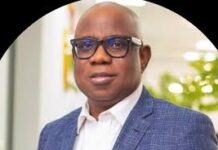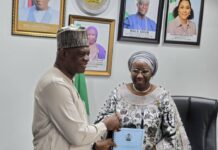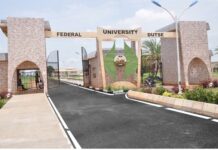Abiodun JIMOH
The Nigerian Railway Corporation (NRC) and the South-East Development Commission (SEDC) are set to collaborate on rehabilitating and optimizing railway infrastructure in the Southeast region, a move expected to enhance economic growth and mobility.
The Managing Director of NRC, Dr. Kayode Opeifa, made this known during a working visit by the SEDC leadership to the NRC Headquarters in Lagos on Wednesday. This marks the first official engagement between the NRC and any regional commission established under President Bola Tinubu’s administration.
Opeifa emphasized the historical significance of railway infrastructure in Nigeria’s economic development, tracing its roots to the colonial era. He reaffirmed the federal government’s commitment to revitalizing the country’s rail network, particularly the narrow-gauge system, to facilitate trade, reduce transportation costs, and drive productivity.
“While Nigeria developed 3,500 kilometers of rail lines in the first 60 years post-independence, the federal government has successfully constructed over 1,000 kilometers of new or refurbished rail lines in the past decade, marking significant progress,” Opeifa said.
He stressed that rehabilitating the eastern corridor railway would restore vital connectivity between the Southeast and other parts of Nigeria, thereby lowering the cost of goods and enhancing regional commerce. Addressing concerns over vandalism, he assured stakeholders that railway assets remain valuable and are not scrap materials, adding that efforts are underway to modernize infrastructure and improve service delivery.
In his remarks, SEDC Managing Director Mark Okoye outlined an ambitious vision to transform the Southeast into Nigeria’s leading investment hub by 2030. He stated that railway development is a core priority for the commission, which aims to create a seamless business environment across the five states in the region.
“Our goal is to harmonize business policies, laws, and investment regulations to attract both domestic and foreign investors. We are also working on an investment corporation to finance long-term projects and ensure financial independence within a decade,” Okoye said.
Security and investment climate enhancement were also emphasized as key priorities, with the commission recognizing the need for stability to drive economic transformation. The partnership with NRC will play a critical role in developing multi-modal transportation systems, industrial clusters, and agro-processing zones across the region.
The SEDC is also engaging various stakeholders, including the Senate, House of Representatives, state governors, private sector players, and the diaspora community. Notably, the Indigenous People of Biafra (IPOB) have expressed interest in tracking the commission’s expenditures to ensure transparency and accountability.
“We are here on a mission to identify and maximize opportunities for regional growth,” Okoye stated.
The visit concluded with a tour of NRC’s operational sites in Lagos, including Iddo Terminus, the Running Shed, the Nigerian Railway Training School, and the Railway Museum, showcasing the corporation’s rich heritage and modernization efforts.
With infrastructure development as a foundation, the SEDC aims to drive the region’s economic expansion from $40 billion to $200 billion within the next decade, focusing on agriculture, industrialization, technology, the creative economy, and tourism. The collaboration with NRC is expected to be a key enabler in achieving this ambitious vision.














